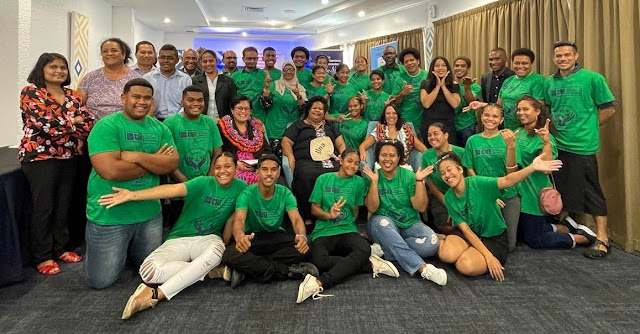Joseph Veramu, Katy Mackey and Mariam Mathew
Fiji is a
paradox; it is considered the hub of the South Pacific and has the largest
economy. Yet despite its fame as a rugby sevens powerhouse, smiling Fijians and
images of Fiji Water (being consumed by celebrities), the nation remains an
enigma in some ways. Statistical data on
corruption and other development issues on Fiji is not easy to come by and Fiji
and other Pacific Island countries are often left off key indices. But this is
starting to change.
On November 16,
Transparency International released the first ever Global Corruption Barometer
– Pacific. This report is welcome news for Pacific nations. Representing the
views of over 6,000 people across ten Pacific countries and territories,
including 1,000 Fijians, it is the most extensive public opinion survey on
corruption ever gathered in the region. It asked everyday people across the
region about their perceptions and lived experiences of corruption.
The report
notes that, “When it comes to corruption, Pacific countries and territories
have remained among the most under-studied in the world.” This data enables
groups working in the anti-corruption space, including CLCT Integrity Fiji, to
develop more effective, evidence-based strategies to build a culture of
integrity.
The day of
reckoning has come, and courage should not be
in short supply!
Across the
region, most Pacific Islanders surveyed support their government’s
anti-corruption measures and believe that ordinary people can make a difference
in the fight against corruption. Yet, the results also show that corruption
impacts all areas of the lives of citizens, that there is a strong perception
of corruption in key institutions and that citizens feel left out of
decision-making processes. Meaningfully engaging citizens is an essential part
of putting the wide range of transparency and good governance commitments made
by Pacific leaders into practice.
The results
for Fiji itself are heartening in some ways and comparatively better than the
other countries surveyed, though still problematic. This demonstrates that the
fight against corruption is never ending and there is no time to rest on our
laurels or slow the pace of advocacy and litigations in the courts.
We will
start off with the good news!
A whopping
83% of respondents in Fiji agreed that ordinary people can make a difference in
the fight against corruption. 56% agreed that the Government is doing a good
job in fighting corruption, although this is slightly lower than the regional
average of 62%.
Generally,
Fijian respondents thought that their institutions, including parliament, civil
servants, police, the courts and religious institutions, were less likely to be
corrupt than respondents in the other countries surveyed.
When asked
if they had paid a bribe to access public services in the 12 months before the
survey, only 5% of Fijian respondents said yes, compared to the regional
average of 32%. Only 17% relied on personal connections and only 4% reported
that they had been offered a bribe to vote a certain way – again, both of these
rates were lower than the regional average.
Of those who
reported paying a bribe, 31% reported it to the relevant authorities, the
highest rate in the region. This demonstrates in part the success that the
national anti-corruption agency FICAC has had in public awareness and advocacy.
The anti-corruption posters appearing on bus shelters, public transport, and
mainstream media, and the young lawyers arguing cases in court have made an
impact. And yet, more must be done. While these results are positive, essential
services must be available to all regardless of who they know or if they can
pay a bribe and free and fair elections remain a hallmark of our democracy.
There were
greater causes for concern as well. A majority of Fijian respondents believe
that corruption is a big problem for the country, in both government (68%) and
the private sector (61%).
When asked
if corrupt officials face appropriate action against them, 31% said they never
or rarely did. 67% believe that companies use money or connections to secure
profitable government contracts at least occasionally.
Perhaps most
worryingly, 39% of respondents felt that their views were ‘never or rarely’
taken into account by government. Only 15% said that the government takes their
views into account frequently or very frequently.
Drawing on
the hope that Fijians reported in this survey, there is room for engaging
citizens at the grassroots level to play proactive roles in curbing
corruption. The survey results indicate that what is needed during the
challenging pandemic period we are going through is more citizens’ engagement.
This will require the government to strengthen access to information, media
freedom and freedom of expression as well as supporting affected communities
and civil society organisations to conduct independent
monitoring of public contracting.
People are
passionate about their country and believe they are a part of the narrative.
They need to feel they are also helping to steer the canoe, not just riding as
passengers. If they are apathetic, then that nurtures the breeding ground for
corruption to flourish. These results show that Fijians are optimistic about
the future. Let’s prove them right and stamp out corruption.





Maybe some analysis of FICAC investigations and subsequent prosecution is warranted.
ReplyDelete[
http://www.paclii.org/cgi-bin/sinosrch.cgi?query=FICAC&results=50&submit=Search&rank=on&callback=on&meta=%2Fpaclii&method=auto&mask_path=fj%2Fcases]
One does not need to be a rocket scientist to see none of the FICAC cases involve Fiji First government MPs or Fiji First party donors.
Recently FICAC has prosecuted Opposition MPs for minor offenses.
[https://fijisun.com.fj/2021/01/26/ficac-to-apply-for-mps-case-to-be-transferred-to-high-court/]
Yet the major cases highlighted by Auditor General are swept under the rug. Case in point is the use of Aliz Pacific to pay the salaries of certain Ministers.
[https://www.fijileaks.com/home/aunty-nur-bano-alis-aliz-pacific-ltd-was-handed-job-to-pay-regime-ministrs-salaries-in-2010-to-2013-18-million-paid-to-ministers-without-supporting-documents-bainimaramas-got-57500-gratuity-payment-i-2012-for-what-who-authorized-it]
Corruption is everywhere if we are whether it may be government officials or private sector, but it is up to us how we handle it and go about it there are officials that we can report corruptions too like FICAC and also these needs to be taken into consideration that they need to do their job and all individuals to take a stand and help stop corruption.
ReplyDelete